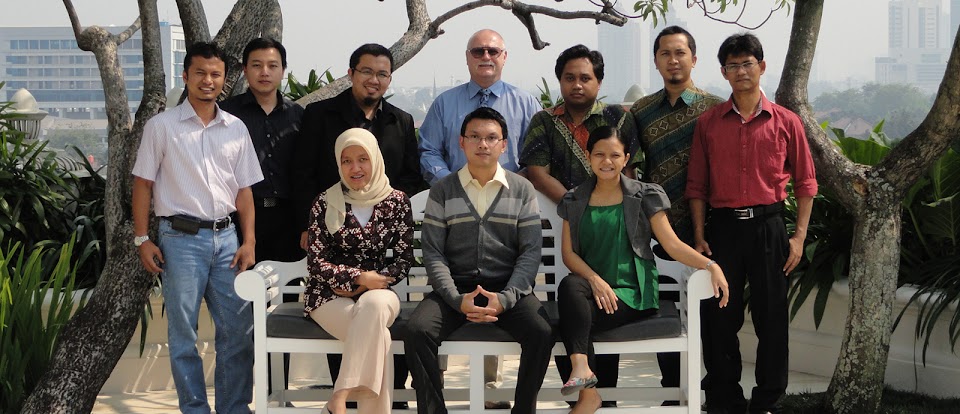W1_HERU_Tuckman
Assesment
1.
Define; Forming, Storming, Norming and
Performing
In a team known to consist of
several personnel formed with different abilities, different attitude, different knowledge and other differences. In uniting compactness
and targets in a
team needed a study later known as four
stages by Dr
Bruce Tuckman in
1965 study of small group that is forming,
storming, norming and performing.
Forming - the team
are polite and avoid conflict. They wonder what is expected of them. They need
roles and responsibilities and clear objectives.
Storming -
Interpersonal conflict arises, with arguments about roles and responsibilities
or differing views or standards. Team needs ground-rules and to listen to each
other.
Norming -
successfully resolved conflict build trust and team members begin to
co-operate.
Performing - the
team is productive and adapts quickly to compensate for strengths and
weaknesses.
Figure
1. Tuckman Stages Model
(source : www.nylt-ysdc.org/edge.ppt)
2.
Are you forming, storming, norming or
performing ?
To determine the condition
of the current team Mahakam 13 conducted
a survey to be adapted to the analysis of Tuckman the survey
results of the following values:
|
|
Forming
|
Storming
|
Norming
|
Performing
|
|
Score
|
27
|
28
|
33
|
31
|
Table
1. Result Test
3.
Development Alternative with Leadership Style
We have know of several alternative used for the needs of the development
team :
|
Lewin's
3 basic leadership styles
|
Likert's
4 leadership styles
|
Goleman's
6 emotional
leadership style
|
| autocratic or authoritative |
exploitative authoritative
|
visionary
|
|
democratic or participative
|
benevolent authoritative
|
coaching
|
|
laissez-faire or delegative
|
consultative
|
affiliative
|
|
|
participative
|
democratic
|
|
|
|
pacesetting
|
|
|
|
commanding
|
Table
2. leadership styles
4.
Preferred Alternative for Leadership Style
Leadership styles based
sources noted above, the team Mahakam 13 can be adjusted with Lewin’s 3 basic leadership
styles are:
·
Autocratic or
authoritative: the leader takes decisions without consulting with others.
·
Democratic or
participative: the leader involves the people in the decision-making.
·
Laissez-faire or
delegative: the leader's involvement in decision-making is minimized.
5.
Selection of Acceptable Criteria
Criteria were selected from Tuckman’s stages can be described as follows:
-
High enthusiasm
-
Have the skills
-
Makes the goals
clear
-
Sees all the options and makes accurate judgements
-
Helps to build the team and avert friction
-
Committed to team and individual
Tuckman's stages of team development can be successfully
applied to teams of differing size. Knowing if your team is forming, storming,
norming or performing allows you to better understand team interactions and
behaviours, enabling quicker conflict resolution, appropriate leadership styles
and ultimately increased productivity.
6.
Comparison of the alternative
Based on the leadership style and the acceptable criteria,
then obtained a conclusion there is no leader without the team members. The responsibility of
achieving objectives is a shared responsibility as the leader alone cannot
achieve them.
A person may be made leader as a formal position but this
does not necessarily mean that he or she can bring the team together to
complete the tasks at hand. Each member will have their own skills that makes
them informal leaders in those areas.
The formal leader needs to be able to work together with
the team and generate trust to build a cohesive group. Just words are not
enough. Appropriate actions will be required to foster trust and to build
confidence.
7.
Performance Monitoring & Post Evaluation of
Result
Can
be explained that
the team Mahakam 13 have very high enthusiasm, different abilities of each person and have similar goals. More details will be able to take a look at the learning stage AACE distance learning program reporting the results of their duties each week over a period of six months.
8.
References
Survey: What Stage is Your Team in? Retrieved from: http://www.cscaweb.org/EMS/sector_team/support_files/tools_for_the_team/tool_stage.pdf
Banis, Lynn. Coaching
Your Team. Message post to : http://ezinearticles.com/?Coaching-Your-Team&id=4695006
Wood badge for the 21
Century. The Teaching EDGE™
[Powerpoint Slide]. Retrieved from : www.nylt-ysdc.org/edge.ppt
Module 4 Managing
groupdiscussions. Developing speaking and listening skill. Retrieved from : http://archive.excellencegateway.org.uk/media/SFL/import/batch1/BATCH%201%20-%20100%20MB%201/S&L_PACK01%20%287%29/SandL_module4.indd-Lo.pdf
Purdue online writing lab. Reference List: Electronic Sources (Web
Publications). Retrieved from :
http://owl.english.purdue.edu/owl/resource/560/10/
Swinton,
Lyndsay. Tuckman's Stages of Team Development: Forming,
Storming, Norming and Performing. Retrieved from : http://www.mftrou.com/tuckman-stages-team-development.html
Bacal & Associates.Practice Effective
Leadership. Retrieved from : http://leadertoday.org/articles/leadershipstylespractice.htm

Excellent posting, Pak Heru. You did a nice job on your research, citing your references properly and you followed our step by step process very well.....
ReplyDeleteBUT....... You are a full week late on this, your first deliverable....
Remember during the class, in the CONSTRAINTS it said QUALITY was the first priority, followed by TIME then COST?
The very real danger is, once you fall behind it is VERY difficult- almost impossible to catch up.
So as of tonight, you should have posted your W2 blog, which is your first open topic.... Plus this is your last week to select a paper topic.... so already you are falling behind and there is nothing I can do to help you if you don't give me an honest hour per day that you promised....
Now let's push to get your W2 blog done and pick your paper topic before Close of Business on Thursday, so you can start working on your weekly report on Friday and Saturday.
BR,
Dr. PDG, Jakarta